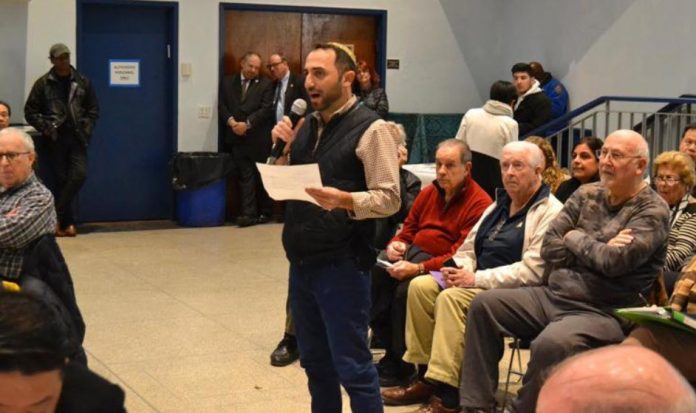
In a stunning about-face, the Bukharian Jewish Congregation of Jamaica Estates tabled its land-use application immediately before Community Board 8 was scheduled to vote on it last Wednesday night.
The 80-14 Chevy Chase St. synagogue sought to amend a granted variance to legalize a larger cellar assembly space, an accessory kitchen and a brick wall.
In its approval for the building’s construction in 2008, the Board of Standards and Appeals said using “a room or other space for the operation of a business engaged in preparing or serving food or beverages for functions, occasions or events” would not be allowed there.
The synagogue had agreed, but the kitchen is used for preparing meals for people at the synagogue and catering.
Around 50 members of the congregation showed up to the meeting. Many defended the variance amendment, calling it necessary for the congregation’s existence, while residents who live by the synagogue say it’s caused problems for the community with traffic and has brazenly ignored what the BSA required of it.
“All these people who are protesting, they’re protesting against people coming in, against the parties,” Ariel Shimunov, the synagogue’s children’s program director, said. “But if you don’t cook the food, we’d bring the food in anyway.”
He also argued that the short brick wall, which was built where bushes and shrubs used to be, is needed because it “helps to protect the environment where children play sometimes — hours of prayers — in the outside yard.”
Judy Greenstein, who lives nearby, brought up how she saw an ad in a newspaper for catering by the synagogue. “This is on a private street in Jamaica Estates, a residential street, and there is no reason why there should be a business there,” she said.
City Councilman Rory Lancman (D-Fresh Meadows), who submitted a letter in support of the synagogue’s application, offered to mediate between the congregation and the residents opposed to its request.
A resolution could be reached that “accommodates the synagogue’s growth” and addresses the critics’ “legitimate concerns,” said the lawmaker, who used to sit on CB 8 and is now a candidate for district attorney.
While the board often makes unanimous or near-unanimous votes, among its members gathered last Wednesday were supporters and opponents of the application.
The CB 8 Zoning Committee had a 4-4 tie when it voted on the matter earlier in the year.
Speaking on Wednesday, board member Kevin Forrestal said he saw ads for the synagogue that mentioned a “a DJ, Photoshopping, luxurious meals and so on.”
But the congregation had told him the kitchen was only used for members, Forrestal said.
He said he had no doubt “that the synagogue does good work and they’re good people in general” but he couldn’t bring himself to support the application.
Forrestal also pointed to how the synagogue has been fined around $91,000 for building code violations, some of them “hazardous.”
Simon Pelman, another board member, said he had spoken at the congregation before and knows it does “a lot of good.”
Still, he couldn’t bring himself to support the application. “I think that as much as I’m for this [request] … I would like to see them withdraw the application for six months, come back to us and tell us what they have done,” he said.
A few minutes later, the synagogue pulled the application from CB 8’s consideration.
But the board will be hearing from the congregation again about the matter.
“We’ll have to re-engage with the community board prior to going forward with the BSA,” Richard Lobel, the attorney representing the congregation, told the Chronicle after Wednesday’s meeting.
Technically speaking, he said, his client’s application may not have been withdrawn from the review process, despite temporarily pulling it from the advisory panel’s review.
Also at Wednesday’s meeting, CB 8 unanimously rejected an application sought for the proposal to build 19 two-story one-family houses at the derelict former Holliswood Hospital property on Palermo Street. For the project to be legal, waivers would have to be granted for the building of the homes that don’t front a mapped road, and for constructing houses on a mapped but unbuilt part of Clover Place.
A private driveway would have to be built for the project, which site owner Steven Cheung — another Lobel client — is behind.
City Councilman Barry Grodenchik (D-Oakland Gardens), who represents Holliswood, spoke out against the plan.
“As far as I’m concerned, they’ve promised a lot and they have not delivered very much of anything,” he said.
It is unclear, Grodenchik added, exactly what Cheung plans for the hospital building.
That structure, while not technically involved in the application CB 8 rejected, has been a matter of concern to some residents.
According to a January 2018 article in the Chinese newspaper Sing Tao Daily, Cheung plans to revamp the hospital building into an apartment building with a library, fitness center and swimming pool.
Holliswood Civic Association President Linda Valentino brought this up, but she said that when she recently asked the developer’s architect what the plans were for the hospital building, “his comment was, ‘We don’t know what we’re going to do with that.’”
She blasted Cheung.
“He’s been a terrible neighbor,” Valentino said. “He doesn’t care about Holliswood.”
Lobel said he did not know what the plans for the hospital building were but pointed out that the building is beyond the scope of the waivers sought by his client.
Concerns were also raised about how the private road would be maintained. Speaking to the Chronicle, the land use lawyer said a homeowners association would likely manage the upkeep.
In response to the negative comments about Cheung, Lobel insisted the single-family home plan would enhance the area.
“Let him proceed with the process,” he said. “Let these homes be developed and, necessarily, the area will be made better by the fact that these will not be vacant lots but instead will be developed.”
credit to qchron.com









